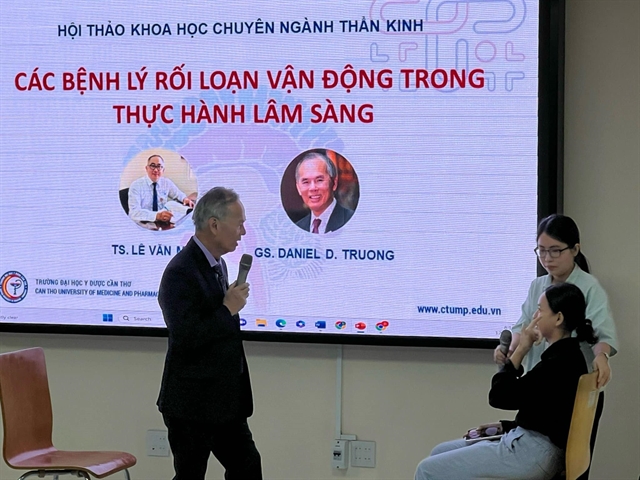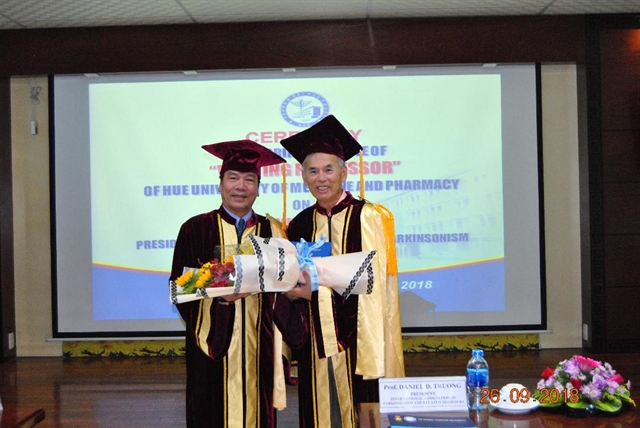 Society
Society

By Kiều Trinh
HÀ NỘI — According to International Association of Parkinsonism and Related Disorders (IAPRD), the IAPRD Lifetime Achievement Award for 2024 will be presented on May 19th to Dr. Daniel Truong, an American of Vietnamese descent, and a renowned neurologist.
Speaking to Việt Nam News, Dr. Truong shared, "I am truly surprised because the recipient of this award last year was my mentor, whom I studied under from 1982 to 1985. So, this is a tremendous encouragement for me to continue serving humanity."
Dr. Daniel Truong served as the President of IAPRD for 8 years, from 2015 to 2022. He is also the Director of the Parkinson's Disease and Movement Disorders Institute in Fountain Valley, California, a clinical neurology professor at UC Irvine, and deputy editor of two neurological science journals, the Journal of Neurological Sciences and the Journal of Neural Transmission.
 |
| Dr. Daniel Truong delivered a lecture at Can Tho University School of Medicine in December 2023. — Photos courtesy of Daniel Truong |
Known for his pioneering approach in reaching out to developing countries, Dr. Truong always has a heart for his homeland, Việt Nam. He has provided invaluable support to the field of neurology in Việt Nam by training and educating neurologists and specialists in movement disorders. In the early 1990s, he helped several Vietnamese neurologists come to the United States for training. "Following that period, I thought that if we were to send Vietnamese doctors to the US for education, it would only enhance the skills of a few individuals. However, if we bring foreign professors, doctors and experts to Việt Nam to train local doctors, it would benefit many more people," reminisced Dr. Truong.
From that idea, he diligently promoted and made significant contributions to the successful organisation of seven international neurological knowledge update forums (International Neurology Forum - INFO in 2004, 2005, 2006, 2007, 2008, 2010 and 2012) with 86 distinguished professors and neurology specialists from North America, Europe and Asia. Through these international neurology forums, Dr. Daniel Truong has provided Vietnamese neurologists specialising in neurology, neurosurgery, psychiatry, neuroimaging, rehabilitative medicine and geriatrics from all three regions of the country with valuable opportunities to update and learn new knowledge about the diagnosis and treatment of movement disorders and Parkinson's disease, stroke, peripheral neuropathy, various types of neuropathic pain, and epilepsy for patients.
In 2016, Professor Daniel Truong was conferred the title of Honorary Professor by the Ho Chi Minh City University of Medicine and Pharmacy in recognition of his significant contributions to the development of knowledge and techniques for treating neurological disorders in Vietnam. Associate Professor Dr. Truong Quang Binh, former Vice Director of the Ho Chi Minh City University Medical Centre, stated, "Dr. Daniel Truong has made a significant contribution to the field of neurology in Việt Nam. We believe that his contributions to organising international neurological conferences and training sessions on the world's most advanced techniques for Vietnamese neurologists and healthcare professionals will greatly benefit patients."
With the assistance of Dr. Daniel Truong, the university was the first to officially implement the use of Botulinum neurotoxin in Việt Nam for treating various conditions such as facial spasms, eyelid spasms, cervical dystonia, dystonia, muscle stiffness, excessive sweating, drooling and chronic treatment-resistant pain. The application of Botulinum neurotoxin in treating movement disorders is also a result of his research process over 40 years ago when he was one of the pioneers in studying movement disorders and demonstrated the effectiveness and safety of Botulinum neurotoxin for this group of disorders.
In 2018, Hue University of Medicine and Pharmacy also awarded him the title of Visiting Professor for his significant contributions to the university's educational endeavours. Associate Professor Dr. Nguyen Minh Tam, Vice Rector of Hue University of Medicine and Pharmacy, expressed, "We are deeply grateful to Dr. Daniel Truong for his efforts in imparting advanced neurological medical knowledge to our university doctors, and we hope that he will continue to participate in teaching and conducting more training courses so that doctors, trainees and students have the opportunity to access beneficial medical knowledge."
 |
| Dr. Daniel Truong was honoured at Hue University of Medicine and Pharmacy for his contributions to the institution's educational endeavours. |
Throughout many decades, he has continuously strived to disseminate knowledge and experience in his field of expertise to the young generation of Vietnamese doctors. Most recently, he returned to Can Tho University for the third time to lecture on tardive movement disorders in December 2023.
Dr. Daniel Truong is also one of the pioneers in the trend of treating patients via telemedicine. For patients with movement disorders who cannot access direct care due to geographical distances, the doctor monitors their movements and reactions to tests via webcam to timely adjust their medication prescriptions. Ms. N. Dietsch, a German, shared, "We admire Dr. Truong as if he were a 'wizard'. He has helped our father tremendously in treating Parkinson's disease. Our father had Parkinson's with rigidity, seemingly incurable, but thanks to the doctor, he could move normally. There were periods when he experienced complications due to environmental changes, leading to unusual symptoms such as delusions, disorders, but with patience and delicacy, Dr. Truong adjusted the dosage of medications little by little, ultimately bringing our father back to complete lucidity. Everything unfolded miraculously. Especially noteworthy is that he entirely treated our father remotely."
After graduating from Ludwig Albert University in Freiburg, Germany, young doctor Daniel Truong was determined to go to the United States to complete his residency in neurology at the University of South Carolina School of Medicine. Later, Dr. Truong completed a three-year research program at Columbia University in New York and the National Hospital for Neurology and Neurosurgery in Queen Square, London, United Kingdom, under the guidance of Professors Stanley Fahn and David Marsden.
Upon arriving in the UK, Daniel Truong was tasked with researching Minicore myopathy, a rare condition. He had to search throughout the UK to find 20 patients to study and write a research grant proposal. He received a substantial grant of $200,000, a significant amount in the 1990s, to conduct his research.
Perhaps part of Daniel Truong's success can be attributed to his incredibly patient and "stubborn" nature. In another study, the determined young man successfully built a research model for Myoclonus, a condition characterised by quick jerking movements that one cannot control. "At that time, my mentor said it was impossible to induce the disease in mice, but I disagreed with this conclusion. I had to repeat the experiments on hundreds of mice, and finally, I managed to induce the disease in several dozen. It turned out that the disease only developed when mice lacked oxygen in their brains. While others maintained this condition for 1 minute, I maintained it for 7 minutes before the disease appeared. After 2 years, I succeeded in creating a model to study Myoclonus," Daniel Truong recounted. To this day, this model remains instrumental for researchers seeking treatment for the disease.
 |
| Doctor Daniel Truong and his wife Diane Truong. |
With substantial funding, including a foundation named after his late wife, Mrs. Diane Truong, the IAPRD, to which he has made significant contributions in building and developing, has extended its reach to remote places around the world, such as Kazakhstan, Uzbekistan and Mongolia. Dr. Truong has served on numerous committees for the organisation, the American Academy of Neurology, and the World Federation of Neurology. He also established the Tardive Research Group, comprised of neurologists and psychiatrists interested in tardive movement disorders. He has lectured in over 25 countries, primarily in developing nations.
Dr. Truong is also the author and co-author of seven important textbooks written for neurology and psychiatry specialists. His book on botulinum toxin has become the best-selling medical book by Cambridge University Press and is now in its third edition. Particularly noteworthy is the cover of the book, which features a 3D image of his dearly beloved late wife, serving as a precious tribute from him to the one who accompanied him through all the ups and downs of life and career. — VNS




